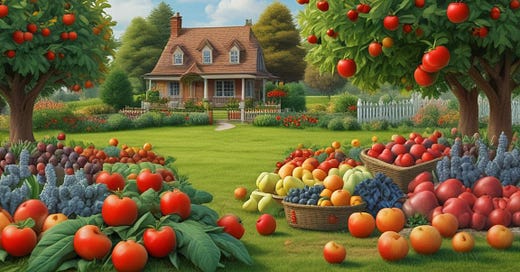Have you ever considered the variety of foods that grow from the earth's bountiful garden — all the foods that God has given us to enjoy? My heart sings over an avocado— with its creamy goodness. And my tastebuds rejoice when I bite into the tangy yellow flesh of a mango. I am even delighted by the sweet sting of a jalapeño pepper on my tongue. Of course, I must not forget garlic, with its undeniable beauty on the palette. And a basil leaf picked straight off the stem — what a refreshingly pungent herb that adds life to many dishes. And let us also remember the queen of all the fragrant edibles: truffles!
Ah, food from the garden.
Ah...the God who created it.
God Gives the Garden
The first two chapters of Genesis set the stage for human sustenance, with all its delights: color, fragrance, texture, and taste. Consider these verses:
(1:11) Then God said, “Let the earth sprout vegetation, plants yielding seed, and fruit trees on the earth bearing fruit after their kind with seed in them”; and it was so.
(1:12) The earth brought forth vegetation, plants yielding seed after their kind, and trees bearing fruit with seed in them, after their kind; and God saw that it was good.
(1:13) There was evening and there was morning, a third day.
(1:29) Then God said, “Behold, I have given you every plant yielding seed that is on the surface of all the earth, and every tree which has fruit yielding seed; it shall be food for you;
(1:31) God saw all that He had made, and behold, it was very good.
(2:8) The LORD God planted a garden toward the east, in Eden; and there He placed the man whom He had formed.
(2:9) Out of the ground the LORD God caused to grow every tree that is pleasing to the sight and good for food.
Vegetables, The Basic Diet of Man
On the third day God created the “first fruits” of food. These were the foods God provided for man from the very beginning — the foundation for our basic diet: fruits, vegetables, and herbs. God created these to meet the essential needs for man's sustenance.
Foods Added Later
Due to man's sin and a change in the earth's environment, man's food supply was altered. After the fall of man, death entered the world, and God sacrificed the first animal to clothe the nakedness of Adam and Eve. Yet, even then, God did not give humans the freedom to eat the flesh of the animals He created. But He did add to man's diet the foods harvested by the sweat of his brow, which included grains, legumes, and tubers. Not that these foods had been forbidden previously, they just were more difficult to produce — and likely not needed by Adam and Eve to survive.
Then, after Noah's flood, things changed again. At that time God granted man permission to eat the flesh of animals. Context assumes the permission was confined to the flesh of "clean" animals, for Noah took seven pairs onto the ark, but he took only one pair of unclean animals (Genesis 7:2). According to Leviticus 11, unclean animals were detestable and unfit for human consumption, inedible (future posts will discuss this topic more thoroughly — examining corresponding New Testament passages such as Peter's vision).
Vegetables: Revisited
Originally, however, God had provided an abundance of fruits, vegetables, and herbs as the first foods for man. This meant, these were the basic needs for man. No one knows better than God what is basic sustenance for His creation. That is why it is fundamentally necessary that fruits and vegetables be emphasized in our diets. We should be consuming fresh fruits and vegetables (raw and cooked) on a regular basis.
Raw vegetables are loaded with vitamins, minerals, and enzymes that are the building blocks of good health. ReformedHealth.net publishes recipes on a weekly basis. Many of these recipes are simple, nutritious, delicious, raw food salads. This is the food God has designed to keep the human body full of health. And in our home, we honor this in our personal diet, incorporating raw vegetables with every meal and raw fruits daily.
The importance of incorporating raw (and cooked) vegetables into the diet regularly -- as well as fruits — is common knowledge. Of next importance are grains, tubers, and legumes. Then meats. With the knowledge we have today, eating this way is intuitive. The question remains: are we applying it?
Restaurant Food
If restaurant menus reflect the current food trends in society, it is obvious that restaurants emphasize meats, milk products, and grains, and maybe a little vegetables. Fruit is rarely served.
If we are to "live by the garden" as God has intended, we must make changes that suit His design. When we do we will discover more ways to delight in the fresh fruits and vegetables God has created for us to enjoy.
Next: Embracing the Lights and Seasons God Created
Return to: Biblical Health Study



